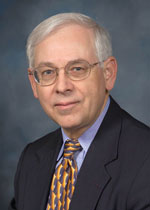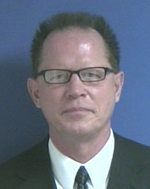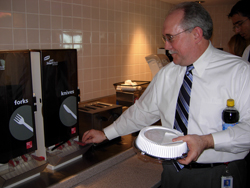 |
Don Leuenberger |
 |
Rick Boldt |
It seems you can’t go a week without hearing the phrase, “Go green.”
There are “green” bloggers, movie stars buying “green” houses and “green” guides that show you how to be “green” at home and work.
Though the saying has become fashionable, UNMC has been “going green” for about two decades with a strong reduce, reuse and recycle program.
And now UNMC, along with its hospital partner — The Nebraska Medical Center — and UNMC Physicians, are stepping up recycling efforts.
“Recycling is the right thing to do,” said Don Leuenberger, vice chancellor for business and finance. “Not only is it important to be good neighbors in the community, but it’s our social responsibility as a medical center and citizens of Nebraska to do what we can to reduce the waste that piles up in our landfills.
Campus recycling coordinator Rick Boldt — with direction from Leuenberger — helped launch a recycling plan in 1989 and the program has grown over the years.
From April 1993, when UNMC opened a recycling center, until March 2008, more than 5,713 tons of paper and 2,530 tons of cardboard have been recycled on campus.
The program was launched to lead the recycling effort as a large organization and to show that institutional recycling was an economically viable and a responsible decision, Leuenberger said.
The medical center recycles many items and materials including mixed paper and cardboard, cans, aerosol cans, batteries, metals, chemicals, electrical wire, lamps, used oil and refrigerants, furniture, computer monitors and electronic equipment.
“We must all find ways to conserve our resources and environment, which also contributes to promoting a healthy environment,” Leuenberger said.
Recycling reflects one of UNMC’s core values of pursuing excellence in an ethical manner, said Deb Thomas, UNMC assistant vice chancellor for business and finance.
“Sustainability is the ethical treatment of the environment,” she said. “Recycling is one tactic to achieve sustainability through reuse and landfill avoidance.”
One of the newest UNMC efforts was moving the recycling facility to a bigger location on the southwest corner of 38th Avenue and Leavenworth Street. It’s the collection point for paper and cardboard, aerosol cans, as well as distribution and storage of red bag waste material.
“It’s much larger than our previous location,” said Boldt, who also is project manager of UNMC business continuity. “We plan on growing our recycling and looking at new opportunities for reduce, reuse and recycle.”
|
Last December, a city recycling drop-off point was organized so students living in apartments and other areas could recycle. Boldt and former UNMC Student Senate President Jonathan Henning organized the effort. The container is on the east side of the UNMC Student Life Center and accepts mixed paper and cardboard, items made of tin, aluminum and plastic.
There also are more visible changes that medical center employees may notice when the go to buy food in the cafeterias.
“We have switched to dispensers for plastic utensils to help cut down on the needless usage of plastic, and placed them in an area after customers get their food,” said Marty Prettyman, director of Food and Nutrition Services at The Nebraska Medical Center. “Usually, when people take the utensils, they take one of everything, just in case; now they take only what they need, plus it has the added benefit of being more sanitary. We also are switching to a more environmentally friendly solution for cleaning food service ware.”
Plans also are underway to place plastic recycling collection containers for 20 ounce bottles at various high traffic areas on campus. Prettyman said 325,152 soft drink containers in plastic bottles are sold each year at the medical center and that does not include water in plastic bottles. The collection containers will enable consumers to recycle these bottles.
The Nebraska Medical Center has an effort to reduce the amount of items that go into “red bag waste” bags needlessly. In general, red bag waste contains items that are contaminated with blood or body fluids, including laboratory cultures used to grow organisms and sharps.
“A lot of times things end up as red bag waste that shouldn’t be in there,” said Susan Holmes, clinical laboratory safety and continuing education coordinator at The Nebraska Medical Center. “We’ve found many non-contaminated items like boxes of plastic gloves, linen, and papers that could be recycled. Separation is really a critical piece in reduce, reuse, recycle and making sure you’re hitting the right bucket is part of the education.”
In 2003, the Biohazardous Waste Committee performed biohazard waste audits, followed by training for both the hospital and UNMC based on the audit findings. This resulted in a 20 percent reduction in biohazard waste generated from previous years. As of 2007, increases in biohazard waste disposal have been noted, leading to consideration of additional audits and education.
 |
Keith Wachter, director of the clinical laboratory/pathology of the Nebraska Medical Center, gets plasticware from one of the new dispensers in the Nebraska Cafe. |
Another reduction initiative in the hospital was the removal of mercury.
Mercury thermometers were removed over the course of a few years, with a final push to remove thermometers, sphygmomanometers and mercury-containing laboratory chemicals in 2005. By early 2006, as many sources of mercury were removed from the hospital as possible.
Even for new campus plumbing projects, managers ask consultants to adhere to the Leadership in Energy and Environmental Design (LEED) principles, which promote “green” design, said Terrence Vail, supervisor of UNMC’s plumbing shop.
LEED promotes lower energy and water bills, reduced greenhouse gas emissions and encourages recycling of building materials.